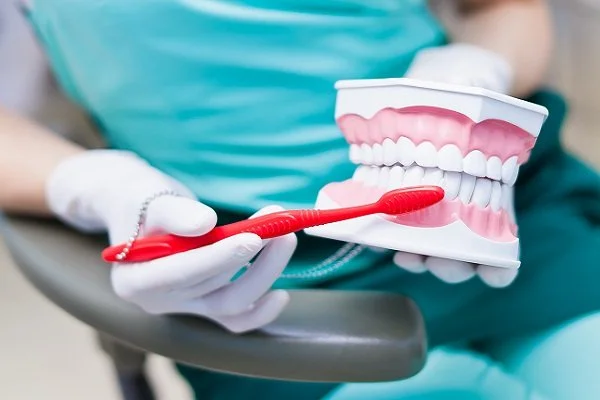Dental Health
Thank you!
We would like to say a big thank you to ToothBrushMe, our dental education hub sponsor. They have decided to donate 25% of all sales to support Going Beyond the Pink! ToothbrushMe sells quality and eco-friendly toothbrushes for every age, click the link down below and use GBTP at check out!
When battling breast cancer, the focus is understandably on treatments like chemotherapy, radiation, and surgery. However, an often-overlooked aspect of cancer care is its impact on dental health. Many breast cancer treatments can have significant consequences for oral hygiene and dental wellness, affecting patients during and after their treatments.
The National Cancer Institute highlights some of the reasons cancer patients have a higher risk of oral complications:
Chemotherapy and radiation therapy slow or stop the growth of new cells.
Radiation therapy may directly damage and break down oral tissue, salivary glands, and bone.
Chemotherapy and radiation therapy upset the healthy balance of bacteria in the mouth.
There are many different kinds of bacteria in the mouth. Some are helpful and some are harmful. Chemotherapy and radiation therapy may cause changes in the lining of the mouth and the salivary glands, which make saliva. This can upset the healthy balance of bacteria. These changes may lead to mouth sores, infections, and tooth decay.
The most common oral complications from cancer treatment include the following: oral mucositis (inflamed mucous membranes in the mouth), infection, salivary gland problems. change in taste, and pain.
Other complications listed by the National Cancer Institute:
Infections in the mouth or that travel through the bloodstream. These can reach and affect cells all over the body.
Inflamed mucous membranes in the mouth.
Taste changes.
Dry mouth.
Pain.
Malnutrition (not getting enough of the nutrients the body needs to be healthy) is caused by being unable to eat.
Dehydration (not getting the amount of water the body needs to be healthy) is caused by being unable to drink.
Tooth decay and gum disease.
Dry Mouth
Dry mouth (xerostomia) occurs when the salivary glands don't make enough saliva.
Symptoms include:
Thick, stringy saliva. Increased thirst.
Changes in taste, swallowing, or speech.
A sore or burning feeling (especially on the tongue).
Cuts or cracks in the lips or at the corners of the mouth.
Changes in the surface of the tongue.
Problems wearing dentures.
How to care for dry mouth:
Clean the mouth and teeth at least 4 times a day.
Floss once a day.
Brush with a fluoride toothpaste.
Apply fluoride gel once a day at bedtime, after cleaning the teeth.
Rinse 4 to 6 times a day with a mixture of salt and baking soda (mix ½ teaspoon salt and ½ teaspoon baking soda in 1 cup of warm water).
Avoid foods and liquids that have a lot of sugar in them.
Sip water often to relieve mouth dryness.
Oral Mucositis
Oral mucositis is an inflammation of mucous membranes in the mouth. Mucositis will heal on its own after your course of cancer treatment has finished. If you have chemotherapy, mucositis usually appears one to two weeks after beginning treatment and heals after one to six weeks.
Symptoms include:
Red, shiny, swollen mouth and gums
Mouth ulcers
Soft white patches of pus
Difficulty swallowing, talking or eating
Bleeding
Soreness or pain in the mouth or throat
Feeling of dryness, mild burning, or pain when eating food
Bad breath
Mouth Care, suggested by the Cleveland Clinic:
Extra — but gentle — brushing. Three to four times a day is recommended. Make sure to use soft bristles and a gentle fluoride toothpaste. Don’t use whitening agents. If toothpaste irritates your mouth, use a salt and baking soda paste. Floss gently. Clean dentures daily.
Mouth rinsing. Rinse your mouth five or six times a day with salt water or a salt and baking soda solution. This is one of the gentlest and most effective ways of cleaning and sanitizing mouth sores. You can also use alcohol-free antiseptic mouthwashes.
Diet. Your diet should be soft and mild. Avoid acidic, spicy and crunchy foods. Avoid sugar and alcohol, which are abrasive and encourage bacterial and fungal overgrowth. Protein shakes are a good idea to boost your nutrition and hydration.
Hydration. You’ll need to drink extra fluids to compensate for your dry mouth and the loss of lubrication in your GI tract. You may want to try an artificial saliva such as enzyme-based Oral Balance®. Some people find that sucking on ice chips provides lubrication and a pleasant numbing effect. You should also protect your lips with balms.
Preventative Care and Treatments
Ways to prevent oral complications include the following:
Eat a well-balanced diet. Healthy eating can help the body stand the stress of cancer treatment, help keep up your energy, fight infection, and rebuild tissue.
Keep your mouth and teeth clean. This helps prevent cavities, mouth sores, and infections.
Have a complete oral health exam before treatment. Due to the risks of more complications, and many dentists will not treat complications while going through treatment.
An oral exam will check for the following:
Tooth decay.
Mouth sores or infections.
Gum disease.
Dentures that do not fit well.
Problems moving the jaw.
Problems with the salivary glands
While the primary goal of breast cancer treatment is to eradicate cancer cells and improve overall health, it’s important not to overlook the impact on dental health. Awareness, proactive dental care, and open communication between healthcare providers are key to minimizing the dental side effects of breast cancer treatments and maintaining oral health throughout the journey of cancer survivorship.


